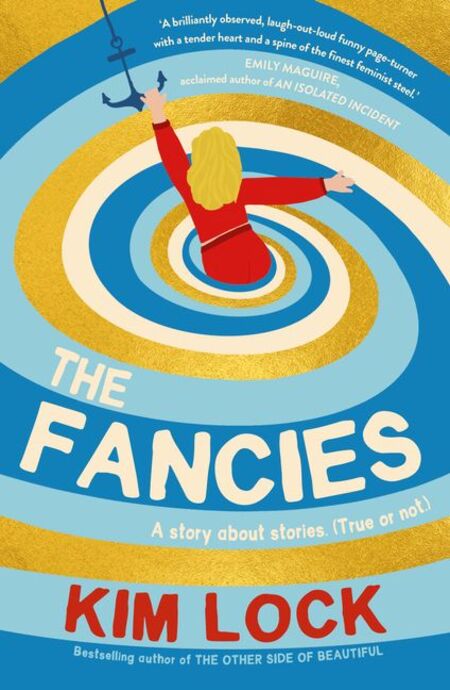(courtesy Harper Collins Publishers Australia)
A lot of people may feel like they don’t have a narrative bone in their body but the truth is, to one degree or another, we are all storytellers.
Not necessarily out loud, although the creative types among most definitely are, but within, with the stories we tell ourselves, and each other, a way of us making sense of who we are, our place in the world and rationalising usually the bad but sometimes the good, things that happen to us.
Nothing ever happens to us without us, consciously or unconsciously, weaving a narrative around it, and while many of these stories do see the light of day, many stay hidden within because it’s too damn painful to let them out.
One person who is well acquainted with the existential tales of life is Abigail Fancy, the daughter of what passes for the South Australian town of Port Kingerton’s landed gentry, with Young Dick Fancy (his dad is naturally enough known as Old Dick) and his feisty but loving wife Nell, calling all the shots in the town whether they actually want to or not.
Abigail fled the town decades earlier at the age of sixteen when life become too unbearable to stay – quite why is best left to the reading of this wittily written and thoughtfully emotional book – and vowed to never return but despite giving the town the finger as she drove from it in her boyfriend’s car, she is forced back into its cloyingly tight embrace.
Was it the tender bare knees, the floaty fluttering dress? Was it the suggestive devouring of four sausages? Or was it just the fact of her, Abigail Fancy, barely taller than any man’s nipples yet larger than their memories and imaginations—a stacked, lush, blonde-haired powerhouse, appearing the same day as a human thighbone washed ashore?
Whatever it was, no one could say. But at that moment, there on Young Dick Fancy’s deck, as a tomorrow promised a tantalising uncertainty, more than one man tumbled helplessly in love.
Port Kingerton, which sits, so the book’s back cover blurb says, “at the butt-end of South Australia”, is one of those small, insular towns where everybody really does know everybody else and nothing happens without someone somewhere seeing it and relaying to a breathlessly interested populace as quickly as human possible.
It was that very gossipy insularity that rocked Abigail’s life to the core the first time around and she’s none too pleased to be back with a mum who seems to resent her (she doesn’t but she’s tough), a dad who’s welcomed her but knows things will be tough for her) and a grandfather who’s dementia means that while he has still has some sage insight to draw on, that he’s not as sharp as he used to be.
Even so, he can still see the vipers in the nest and it’s his narrative chapters – the chapters are split between Abigail, her parents & others, and her grandfather giving The Fancies are delightful multitude of perspectives that works beautifully – which skewer the suffocating sensibilities of the town to a tee.
Abigail is understandable resentful and angry but as the book progresses, also cautiously open to the fact that maybe she can build a life her, a slowly-dawning sensation that keeps getting knocked back but she knows deep down that life won’t change fundamentally until the town makes its peace with the events of some two decades earlier.
(courtesy official Kim Lock Facebook page)
But given the propensity of two many people in the town to hold onto grudges and make erroneous assumptions based on the slimmest of gossip tidbits and the hearsay of others – there’s one chapter in The Fancies where a series of innocuous acts by Abigail which include sending money to a friend are twisted and turned so hilariously monstrously that she emerges sounding like a conspiratorial criminal when the smallminded lowlifes of the time have had their say – her re-entry into the town is going to be a tough one and will rely on a good many other people being willing to listen to the truth and not just the stories they tell themselves.
The beauty of The Fancies is that it takes these stories we tell ourselves and each other and asks us in ways humourously tilted and incisively cutting why it is we are all too prone to believe falsities that titillate over garden variety, humanity-drenched truth?
The reality of Port Kingerton’s communal life, and those who live in it, or have, like weary of life but feistily alive Abigail, begrudgingly returned to it, has been shaped by all kinds of lies, untruths and poorly arrived-at assumptions, with no one, including Abigail’s parents, willing to really dig and find out if the stories they have invented or been told, are an accurate reflection of what really happened.
The Fancies burns slowly and carefully to this reckoning of lies vs. truth in ways that feel lived-in and honest, and groundedly and affectingly human and which make you realise again and again how much of who we are and how we relate to others rests on the types of stories we tell and how much effort we put into ascertaining their veracity, if any.
Told vivaciously and with a blissful gift for innate storytelling woven by Lock into every word and chapter, The Fancies brings together profound truth-telling and fallible humanity into a story that percolates along on a bed of wit and wisdom, of insight and close-mindedness, driven, always, by the willingness all of us have to stick with the narrative that suits us best.
Because by the time Abigail Fancy and Jessica Bram began scrapping over who got to hand out the orange slices on Miss Partridge’s story-time mat, new grudges began to be far more interesting than old ones.
Especially when the intervening generation had laboured for peace. And frankly, peace is boring.
It sadly doesn’t matter whether it is true or not, and while we may think nothing of the stories we wrap ourselves to comfort or dead the pain, or make buoyant or self-justified something quite darkly not so, the truth is they can wound and hurt as Abigail can attest all too painfully.
But you can only suppress pain and trauma for so long and twenty-four years after Port Kingerton three its young women to the wolves and failed to find out what truly happened to them, content to let group think triumph over empathy and care, it finally if reluctantly begins to make peace, weird thigh bone on the beach and burning fishing boat all, with its flawed past.
Rich with vivacious humour, startlingly well-realised characters and dialogue that zings with wit and humanity (good, bad and indifferent), The Fancies is a supremely wonderful piece of storytelling that knows we are capable of stories without number but that asks us to consider what those stories can do to others and whether in the telling we may doing more harm than good and may doom people to lives lived in hurtful shadows until the truth hopefully emerges (if it does at all) sometimes in a much-delayed future.

